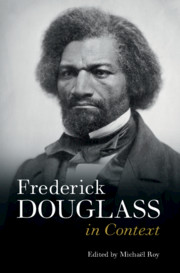Book contents
- Frederick Douglass in Context
- Frederick Douglass in Context
- Copyright page
- Contents
- Illustrations
- Contributors
- Chronology
- Abbreviations
- Introduction
- Part I Places
- Part II Genres
- Part III Activism
- Part IV Philosophy
- Part V Networks
- Chapter 23 The Underground Railroad
- Chapter 24 Colored Conventions
- Chapter 25 Family
- Chapter 26 Correspondence
- Chapter 27 Intertextuality
- Part VI Afterlives
- Further Reading
- Index
Chapter 27 - Intertextuality
from Part V - Networks
Published online by Cambridge University Press: 16 June 2021
- Frederick Douglass in Context
- Frederick Douglass in Context
- Copyright page
- Contents
- Illustrations
- Contributors
- Chronology
- Abbreviations
- Introduction
- Part I Places
- Part II Genres
- Part III Activism
- Part IV Philosophy
- Part V Networks
- Chapter 23 The Underground Railroad
- Chapter 24 Colored Conventions
- Chapter 25 Family
- Chapter 26 Correspondence
- Chapter 27 Intertextuality
- Part VI Afterlives
- Further Reading
- Index
Summary
As the preeminent black orator and author of the nineteenth century, Frederick Douglass filled his speeches and writings with intertextual references, from the Western classical tradition to the Bible to contemporaneous British and American writers. In his various roles as antislavery activist, writer, editor, and publisher, Douglass employed intertexts as tools of rhetorical suasion and authority.As his fame grew, so too did the complexity and range of literary references. This essay looks at intertexts in Douglass’s speeches, his 1845 Narrative, and his 1853 novella, The Heroic Slave.
Keywords
Information
- Type
- Chapter
- Information
- Frederick Douglass in Context , pp. 329 - 340Publisher: Cambridge University PressPrint publication year: 2021
